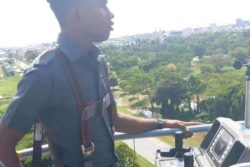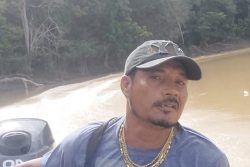MOSCOW, (Reuters) – Russian police wrestled opposition leader Alexei Navalny into a patrol wagon yesterday moments after he appeared at a rally to urge voters to boycott what he said would be a rigged presidential election in March.
Navalny has little chance of influencing the election, likely to be won comfortably by President Vladimir Putin, but his ability to use social media to mobilise crowds of mostly young protesters in major cities has irked the Kremlin.
The numbers attending Sunday’s protests across Russia — some shouting “Putin is a thief” — appeared lower than previous demonstrations staged by Navalny, Reuters reporters said, suggesting momentum may have shifted away from him. Video footage posted on social media showed Navalny appear on Moscow’s main thoroughfare, Tverskaya Street, a few hundred metres from the Kremlin, to join several hundred supporters taking part in the protest, which the authorities had said was illegal.
He had only walked a short distance when he was surrounded by police officers wearing helmets. They grabbed him and forced him to the ground on the pavement, and then dragged him feet first into the patrol wagon, the video footage showed.
He was held at a police precinct in central Moscow for several hours before being released without charges, his lawyer Olga Mikhailova told Reuters, adding that Navalny would face court at a later date.
If charged with violating laws on holding demonstrations, Navalny could face up to 30 days in prison.
Navalny emerged as a threat to the Kremlin’s tight grip on power on June 12 last year, when thousands of his followers defied police prohibitions to protest in cities across Russia.
On Sunday, around 1,500 protesters converged at Manezh Square, adjacent to the Kremlin, but were blocked from getting any further by metal barriers and dozens of police in riot gear.
Hundreds of people also protested in St. Petersburg, Russia’s second-biggest city, in Yekaterinburg in the Ural mountains, and other major centres.
By 1830 Moscow time (1530 GMT), police had detained 257 protesters nationwide, according to OVD-Info, a non-governmental group that tracks the arrests.
Navalny, who says he has faced a campaign of harassment from the authorities, has struggled to mobilise the same numbers in the two nationwide protests he has called since the breakthrough protest in June.
In Moscow on Sunday, the protesters who had accompanied Navalny until his detention were at times hard to distinguish from the flow of shoppers and sight-seers on Tverskaya Street.
A Reuters reporter heard two American tourists asking if Putin “is coming to this parade?” A few metres from where Navalny was detained, a tour guide was telling a group of clients about the history of a pre-revolutionary mansion.
Putin, 65, has been in power, either as president or prime minister, since 2000, longer than veteran Soviet leader Leonid Brezhnev and outstripped only by dictator Josef Stalin.
Many voters credit him with restoring stability after the turbulence following the collapse of the Soviet Union, and of rebuilding Russia’s influence abroad through his foreign policy.
Putin has said the presidential election will be fair, and that Navalny, lacking real popular support, is irresponsibly trying to foment social anger which could tip Russia back into instability.
Putin’s opponents say he is maintaining his grip on power by eroding democracy.
About 200 protesters gathered in Vladivostok, on Russia’s Pacific coast, alleging that the election would be skewed in Putin’s favour.
“We have not been given any choice,” said local resident Vladimir Redko, who turned up to the protest carrying a small child in his arms.







